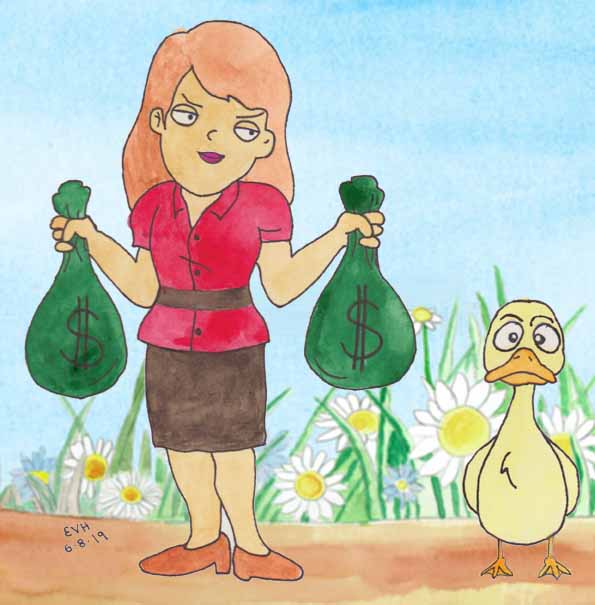
Jataka 136
Suvaṇṇahaṃsa Jātaka
The Swan with Golden Feathers
as told by Eric Van Horn
originally translated by Robert Chalmers, B.A., of Oriel College, Oxford University
originally edited by Professor Edward Byles Cowell, Cambridge University
This story will remind you of the goose that laid the golden egg.
A subtle point that the Buddha makes is that it is through restraint and humility that prosperity comes to you. Throughout Buddhist history the teachers who often ended up with the largest and most successful monasteries were the ones who led the most austere lives. Prosperity also often comes to those who are the most generous. Be humble. Live simply. Be generous. This is the way to be rich.
“Be contented.” This story was told by the Master. It is about a nun named Fat Nandā.
A lay brother at Sāvatthi had offered the nuns a supply of garlic. He sent for his chief servant and gave orders that, if they should come, each Sister was to receive two or three handfuls. After that they made a practice of coming to his house or field for their garlic.
Now one holiday the supply of garlic in the house ran out. The Sister Fat Nandā, when she went to the house, was told that there was none left. It had all been used and that she must go to the field and collect it herself. So she went to the field and carried off an excessive amount of garlic.
The chief servant grew angry and remarked what a greedy lot these Sisters were! This annoyed the more moderate Sisters. The monks were also annoyed at the criticism when the Sisters repeated it to them. They told the Blessed One what had happened. The Master rebuked the greed of Fat Nandā. He said, “Monks, a greedy person is harsh and unkind even to the mother who bore him. A greedy person cannot convert the unconverted, or make the converted grow in grace, or cause alms to be offered, whereas the moderate person can do all of these things.” In this way the Master pointed out the moral, ending by saying, “Monks, as Fat Nandā is greedy now, so she was greedy in times gone by.” And thereupon he told the following story of the past.
Once upon a time when Brahmadatta was reigning in Benares, the Bodhisatta was born as a brahmin. When he grew up he married a bride of his own rank. She bore him three daughters. They were named Nandā, Nanda-vatī and Sundari-nandā.
When the Bodhisatta died, they were taken in by neighbors and friends. He was born again into the world as a golden mallard endowed with the consciousness of his former lives. When he grew up, the bird viewed its own magnificent size and golden plumage and remembered that previously he had been a human being. When he discovered that his wife and daughters were living on the charity of others, the mallard thought that his plumage was like hammered and beaten gold and how by giving them a golden feather he could enable his wife and daughters to live in comfort.
So he flew away to where they lived and landed on the top of the central beam of the roof. Seeing the Bodhisatta, the wife and girls asked where he had come from. He told them that he was their father who had died and that he had been born as a golden mallard. He had come to visit them and put an end to their poverty. “You shall have my feathers, one by one,” he said. They will sell for enough to keep you all living in ease and comfort.” So saying, he gave each of them one of his feathers, and then he left.
After that he would return from time to time to give them another feather, and with the proceeds of their sale these brahmin women became prosperous and quite well-to-do. But one day the mother said to her daughters, “There's no trusting animals, my children. Who’s to say that your father might not go away one of these days and never come back again? The next time he comes, let’s pluck him clean of all his feathers.”
Thinking this would cause him pain, the daughters refused. But in her greed the mother called the golden mallard to come to her one day, and then she took him with both hands and plucked him clean.

Figure: Plucked Clean!
Now the Bodhisatta’s feathers had this property that if they were plucked out against his wish, they ceased to be golden and became like a crane’s feathers. And now the poor bird, though he stretched his wings, could not fly, and the woman threw him into a barrel and gave him food there. As time went on his feathers grew again. but they were plain white ones now. He flew away to his own home and never came back again.
At the close of this story the Master said, “Thus you see, monks, how Fat Nandā was just as greedy in times past as she is now. And her greed then lost her the gold in the same way that her greed now will lose her the garlic. See how her greed has deprived the whole order of nuns of their supply of garlic. Learn from this to be moderate in your desires and to be content with what is given you, however small that may be.” So saying, he uttered this stanza:
Be contented, not craving for further store.
They seized the swan, but had its gold no more.
